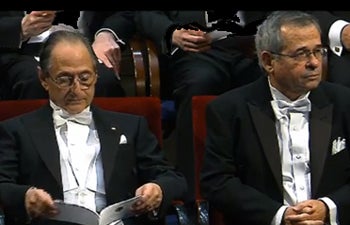Nobel Medal Bestowed on Warshel
King Carl XVI Gustaf of Sweden presented USC’s Arieh Warshel and two colleagues with the 2013 Nobel Prize for Chemistry at a white-tie ceremony in Stockholm today.
The Royal Swedish Academy of Sciences awarded the prize to Warshel, Distinguished Professor of Chemistry at the USC Dornsife and fellow of the National Academy of Sciences, along with Michael Levitt of Stanford University and Martin Karplus of the Université de Strasbourg in France and Harvard University for the development of multiscale models for complex chemical systems.
Warshel, Karplus and Levitt developed methods to model chemical reactions using computer simulations — a cornerstone of modern chemistry.
With the Swedish Royal Family on the right side of the stage at the Stockholm Concert Hall and the newly minted Nobel laureates on the left, Carl-Henrik Heldin, chairman of the board of directors of the Nobel Foundation, extolled the history of the awards and praised the visionary work of the laureates.
Each laureate in turn received a medal, a diploma and a document confirming the Nobel Prize amount. Warshel will receive one third of the Nobel Prize total award of 8 million Swedish kronor, equivalent to about $1.2 million.
He became the fourth Nobel laureate at USC, joining the ranks of George Olah, Daniel McFadden, both of USC Dornsife, and Murray Gell-Mann of the Keck School of Medicine of USC.

Nobel Laureates Arieh Warshel, Distinguished Professor of Chemistry at USC Dornsife and fellow of the National Academy of Sciences (right), and Michael Levitt of Stanford University at the Stockholm Concert Hall in Sweden receive their medals at the Stockholm Concert Hall in Sweden.
Before the awards were presented, Heldin emphasized the importance of curiosity-driven research — exactly the sort that won Warshel and his colleagues the prize.
“When these studies were carried out, their purpose was only to answer interesting questions,” Heldin said. “But the results that were obtained have also given us important insights into the mechanisms behind various diseases.”
Warshel has often remarked that his research was driven by his own insatiable curiosity about enzymes, their role in the body and the way they function. In his recent Nobel lecture, Warshel likened his research to probing the workings of a clock. He is aiming for a better understanding of the way the “gears” inside the cell interact and drive cellular functions.
Following Warshel’s lecture, Levitt expanded on his analogy: “Biology is all detailed interactions . . . the insides of cells were not like a bunch of blood or soup. They were actually like clockwork. Molecules have shapes and they function when these shapes move. And that’s exactly like a watch or a motorcar.”
During the award presentation, Heldin lauded the international nature of the research — a concept that rings especially true for Warshel, who began his work in his birth country, Israel, and continues it today at USC.
“Global challenges are best studied through international cooperation. Science and scientists know no international borders,” said Heldin, who called for continued funding for science similar to that being honored at the ceremony.
“Today it is more important than ever to continue and even increase support for research,” he said. “In particular, for basic research.”
After the conclusion of the ceremony, the laureates retired to Stockholm City Hall for a banquet in their honor.